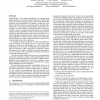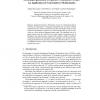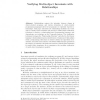127 search results - page 13 / 26 » Object Composition in Scenario-Based Programming |
156
click to vote
PLDI
2012
ACM
13 years 4 months ago
2012
ACM
Linearizability is a key design methodology for reasoning about tations of concurrent abstract data types in both shared memory and message passing systems. It provides the illusi...
130
click to vote
COOPIS
2003
IEEE
15 years 7 months ago
2003
IEEE
We propose a parallel and distributed component framework for building Grid applications, adapted to the hierarchical, highly distributed, highly heterogeneous nature of Grids. Thi...
117
Voted
ER
2009
Springer
15 years 9 months ago
2009
Springer
Goals are often used to represent stakeholder’s objectives. The intentionality inherited by a goal drives stakeholders to pursuit the fulfillment of their goals either by themse...
213
Voted
CP
2009
Springer
16 years 3 months ago
2009
Springer
Equidistant Frequency Permutation Arrays are combinatorial objects of interest in coding theory. A frequency permutation array is a type of constant composition code in which each ...
109
click to vote
ECOOP
2011
Springer
14 years 2 months ago
2011
Springer
Relationships capture the interplay between classes in object-oriented programs, and various extensions of object-oriented programming languages allow the programmer to explicitly ...



